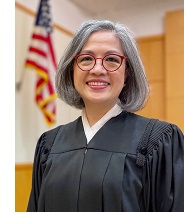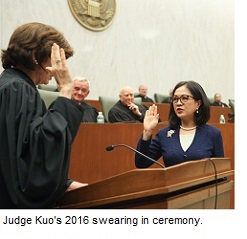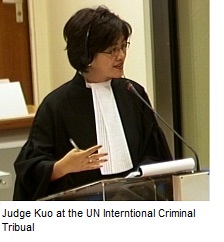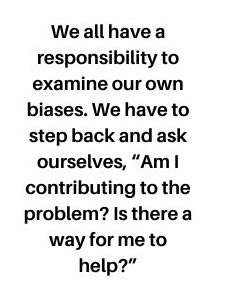
 Judge
Peggy Kuo has had many firsts. She was the first in her family to
graduate from Yale and Harvard Law; the first to successfully
prosecute sexual violence as a crime against humanity; and one of
the first Taiwanese-American judges. She began her career as an
Assistant U.S. Attorney in the District of Columbia before
investigating and prosecuting hate crimes and police misconduct at
the Department of Justice as a trial attorney. She then spent 1998
to 2002 at the United Nations
International Criminal Tribunal for the former Yugoslavia in
The Hague, which, for the first time, ruled that rape was a crime
against humanity. Kuo returned to New York as litigation counsel at
WilmerHale LLP, presided
over hearings of federal securities laws violations at the New
York Stock Exchange, and was Deputy Commissioner and General
Counsel of the nation’s largest municipal tribunal, the New
York City Office of Administrative Trials and Hearings.
Judge
Peggy Kuo has had many firsts. She was the first in her family to
graduate from Yale and Harvard Law; the first to successfully
prosecute sexual violence as a crime against humanity; and one of
the first Taiwanese-American judges. She began her career as an
Assistant U.S. Attorney in the District of Columbia before
investigating and prosecuting hate crimes and police misconduct at
the Department of Justice as a trial attorney. She then spent 1998
to 2002 at the United Nations
International Criminal Tribunal for the former Yugoslavia in
The Hague, which, for the first time, ruled that rape was a crime
against humanity. Kuo returned to New York as litigation counsel at
WilmerHale LLP, presided
over hearings of federal securities laws violations at the New
York Stock Exchange, and was Deputy Commissioner and General
Counsel of the nation’s largest municipal tribunal, the New
York City Office of Administrative Trials and Hearings.
Now a federal magistrate judge for the Eastern District of New York,
Kuo says she always wanted a life in public service to make a
difference in people’s lives. Kuo’s desire to help people started at
an early age. Her dad, an engineer, left Taiwan for New York in 1964
in search of a better life, leaving behind a pregnant wife and
daughter. Two years later, Kuo met her father for the first time
when they joined him as part of the first wave of immigrants allowed
into this country after the passage of the 1965 Immigration
and Nationality Act.
Growing up in Manhattan's Washington Heights wasn’t easy. “There
were very few Asians,” says Kuo, who learned to speak English at a Head Start program and
recalls her older sister pretending to know Kung-Fu when people
called them “ching chong” and other racist slurs. Kuo’s parents
stressed the importance of education and job security--and all four
Kuo daughters excelled in school. “We were mindful that because we
were seen as foreigners, we had to do better than everybody else.”
Kuo says. “There was never any question about getting straight A’s.”
Aware that Chinese culture tended to value
boys more than girls, the Kuo sisters supported each other. “There
were four of us, so it was like ‘Little Women.’ We had a lot of fun,
but we knew we had responsibilities.” The plan worked. Today,
they’re all doctors and lawyers--and Kuo proudly remembers her
parents by her side at her swearing-in ceremony on January 5, 2016,
a particularly poignant day because her mother died shortly after.
“My mom was always one of my big cheerleaders,” Kuo says. “When I
told her I was appointed, she said, “It's about time they made you a
judge!”
We spoke to Kuo about Asians in the judiciary, Asian hate, and why
we need to hold political leaders accountable.
Were you the first Asian judge
in the Eastern District of New York?
I'm definitely the first Taiwanese-American judge, but there were
other Asian American judges before me: Marilyn
Go, Pamela
Chen and Kiyo
Matsumoto. So, I was the fourth Asian American judge in the
Eastern District of New York. Since then, there have been several
more including Diane
Gujarati, Sanket
Bulsara, and James
Cho.
 Were there many Asian judges when you started out?
Were there many Asian judges when you started out?
In 1988, there were no Asian American judges in D.C., where I was
practicing, and no federal judges in New York. In 1993, Marilyn Go
was appointed, and only in 1994 was Denny
Chin appointed as a District Judge in the Southern District of
New York.
Are AAPI still underrepresented in the judiciary?
Representation outside the Eastern District is not great. But it’s
getting better. And there are now AAPI judges in places you wouldn’t
necessarily expect, like Colorado, Texas and Michigan.
How did you end up at Yale?
I wanted to go to Yale because of its emphasis on undergraduate
education and because of its Directed Studies program where you read
original works in Western Civilization freshman year. I applied
early action and got in. My parents’ reaction was, “It’s not too
late to apply to Harvard.” So I promised them I would go to Harvard
for law school. I don’t recommend making those kinds of promises!
But, luckily, I got into Harvard Law School four years later.
How many Asians did you see at Harvard Law and how many of those
were Asian women?
My law class had over 600 students, and there were something like 16
Asian Americans. Of that group, maybe half were women. When I
started at the U.S. Attorney's Office, there was only one other
Asian American woman and people got us mixed up all the time.
How did you end up in The Hague--and eventually make history?
I had been practicing law for 10 years and I’d always been
interested in the Nuremberg
Trials after World War II. When I returned from a German
Chancellor fellowship in Berlin, people knew I was interested
in international criminal law, so when the tribunal formed and they
were looking for lawyers, I was approached about joining.
 What impact did your experience in The Hague have
on you personally and professionally?
What impact did your experience in The Hague have
on you personally and professionally?
It was amazing because I worked in an international environment
where my colleagues came from different backgrounds and legal
systems. A group of us are still close friends, and we visit each
other in places like Brazil or Australia. We all learned from each
other. Certain things that we take for granted aren't shared by
other legal systems, and so, in that sense, I appreciate what we
have but also see where there might be room for improvement. It was
also professionally very rewarding to meet people and to learn about
law while working alongside them. During the investigations and
prosecutions, I met survivors of atrocities and was inspired by
their strength and resilience.
How did it feel to change international law by having rape
declared a crime against humanity?
We had to be creative because it wasn't a given that the court would
agree with us that rape could be a crime against humanity as a form
of torture or enslavement. And it wasn't a given that the witnesses
would come and testify. There was no reason for them to trust us.
Getting the evidence presented and showing that it could be done was
important, and we had to figure out how to make that happen. Those
of use working on the case took the responsibility seriously, but we
didn’t necessarily think, “Wow, this is historic.” We were just
trying to do the best we could and get the best outcome.
What worried you most about the trial?
The witnesses could have been intimidated because they were all
scared. We were worried that the judges might draw the legal lines
narrowly. We had to come up with both the legal arguments and have
the facts and the evidence to support them.
Those women were so brave to testify against the military
commanders who raped them. There was even a documentary, I
Came to Testify, about them.
They were the real heroes. Most of them were very young, 15-16 years
old, when the crimes happened. By the time they testified, they were
young women in their 20s who had been displaced from their homes and
in many cases, their families. They had to process what had happened
and have the strength to go back and relive the trauma. They told us
they were afraid of how they might react to seeing the perpetrators
and being in the same room with them. But they were all fantastic
witnesses.
Did you celebrate the verdict?
When the verdict came out, there was a lot of press attention,
saying it was a victory and historic first. But in our minds, it was
not enough. For the victims, it will never be enough. They lost
family members, and to this day they don't know what happened to
them. We moved the needle on justice, but there is still a lot that
has to be done. We did not stop war or sexual violence.
What kinds of hate crimes were you prosecuting at the Department
of Justice?
I prosecuted a cross burning case, where someone tried to drive a
mixed-race couple out of a neighborhood. There were attacks on black
churches, some of which were racially motivated. My colleagues dealt
with far right extremist groups who had attacked and killed Alan
Berg, a Jewish radio talk show personality. Some incidents
were violent, and some were meant to be intimidating. My division
also earlier prosecuted the Vincent
Chin case.
So basically, nothing has changed; the hate crimes back then are
the same as now?
Unfortunately, much remains the same.
 Are you surprised by the ongoing level
of Asian hate crimes now?
Are you surprised by the ongoing level
of Asian hate crimes now?
There has always been a strain of anti-Asian sentiment running
through American history, from the exploitation of railroad workers
in the West and the Chinese Exclusion Act of 1895, to the internment
of Japanese Americans during World War II. There were massacres and
large-scale acts of violence, especially in the 1800s. Asians will
often get blamed and attacked for larger problems in society.
While there are more Asians in this country now than in the past,
the larger number of hate crimes directed against Asians is
distressing because it doesn't have to be that way. Anti-anything is
not a natural thing. My experience in the Balkans showed me that
they were unfortunate to have political leaders who stoked ethnic
divisions for their advantage. A lot of the witnesses in Bosnia told
us people lived in harmony for many years. I hear echoes of that
when I see what is happening here.
Are you saying political leaders here stoke racism and
hate?
Anti-Asian hatred is not a natural outgrowth of COVID or of any
other circumstances. People need to be mindful of the effect of what
they're saying when they talk about political, economic, and social
issues.
What advice do you have for those who might be making the
situation worse?
People have to start seeing each other at a human level. We're all
human beings, and are in society together. We have to be careful not
to inadvertently create divisions where none exist. And people
should not fall back on old stereotypes. We all have a
responsibility to examine our own biases. We have to step back and
ask ourselves, “Am I contributing to the problem? Is there a way for
me to help?” We should call out racism when we see it and be willing
to step in to help the people who are being targeted. It's very hard
to stand up for yourself in the moment if other people don't step
in. That is how bigger problems start. It has been said that the
only thing necessary for evil to triumph is for good people to do
nothing. One thing I've learned from the Balkans conflict is once
things get out of hand, it’s very hard to stop it. And that is
really scary.
So leaders need to be careful because people take their cues from
them?
Stoking any kind of division is harmful. That’s what happened in the
Balkans and with the genocide
in Rwanda. The hatred was stoked by political leaders through
the media. The leaders were saying, “Go after this particular group
because they're cockroaches. They're not even human.” Add to that,
the mob mentality that can exist with a large number of people, plus
violence and emotions, and it’s a recipe for disaster. Another
lesson that people don't talk about very much is the power of media
and the use of dehumanizing language, which can lead people to do
horrible things to each other.
Is there a point of no return?
People talk about the dogs
of war. Once the dogs of war are unleashed, it’s very hard to
stop. All the little signs of conflict have to be addressed early
on. People often feel very powerless, but every little bit helps;
educating yourself about things, and about people, and treating
people with kindness and dignity. All of those things help.
You once said you felt like you were carrying the hopes of your
parents on your shoulders, as well as the hopes of 23 million
Taiwanese and 2 billion Asians worldwide. That’s one heck of a
burden for a kid to carry.
I agree! But I don’t feel I am carrying that burden alone anymore.
There are many others doing wonderful things, so we all share that
burden. No one has to be all things at all times.
It’s hard trying to please everybody and yourself.
I try to encourage everybody to be the best they can. Girls are
often told they can't do certain things, but boys are also made to
understand that they shouldn't do certain things. People shouldn't
hold themselves back because of artificial ideas of what they can’t
achieve. People should not internalize barriers. I've been told
through the Asian American Bar
Association, for example, that there are not many
Asian-American litigators, and one of the explanations being
explored is that Asians see themselves as not someone who stands up
in court and makes arguments.
Because we’re expected to be weak and submissive?
We’re not supposed to complain. If you’re good, don't be showy about
it, and don't be the best one. Be one of the best. My dad still says
things like, “The highest stalk of wheat gets its head chopped off.”
What advice do you have for young Asians who are just starting
out?
Don't be so hard on yourself. Don’t feel like you have to do
everything. Do what you have to do, and then do what you want to do.
Make sure you have a way to support yourself, but then find ways to
make yourself happy. Pursue things that are satisfying and
fulfilling. Be kind to others and be kind to yourself.
What happens after your current term expires on October 8, 2023?
I hope to do this for a long time. I feel like I’m just getting
started.